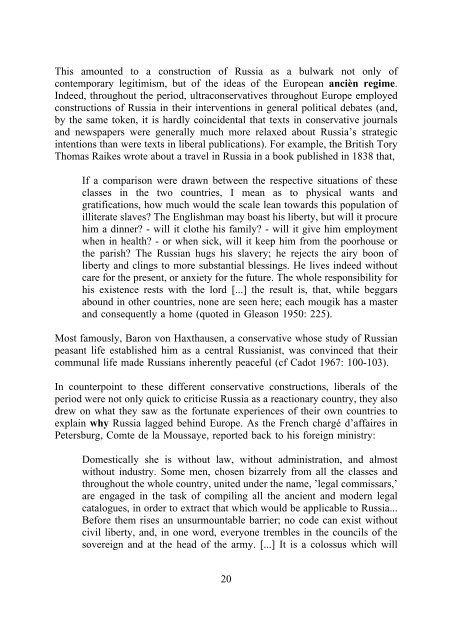RUSSIA AS EUROPE'S OTHER Iver B. Neumann European ...
RUSSIA AS EUROPE'S OTHER Iver B. Neumann European ...
RUSSIA AS EUROPE'S OTHER Iver B. Neumann European ...
You also want an ePaper? Increase the reach of your titles
YUMPU automatically turns print PDFs into web optimized ePapers that Google loves.
This amounted to a construction of Russia as a bulwark not only of<br />
contemporary legitimism, but of the ideas of the <strong>European</strong> ancièn regime.<br />
Indeed, throughout the period, ultraconservatives throughout Europe employed<br />
constructions of Russia in their interventions in general political debates (and,<br />
by the same token, it is hardly coincidental that texts in conservative journals<br />
and newspapers were generally much more relaxed about Russia’s strategic<br />
intentions than were texts in liberal publications). For example, the British Tory<br />
Thomas Raikes wrote about a travel in Russia in a book published in 1838 that,<br />
If a comparison were drawn between the respective situations of these<br />
classes in the two countries, I mean as to physical wants and<br />
gratifications, how much would the scale lean towards this population of<br />
illiterate slaves? The Englishman may boast his liberty, but will it procure<br />
him a dinner? - will it clothe his family? - will it give him employment<br />
when in health? - or when sick, will it keep him from the poorhouse or<br />
the parish? The Russian hugs his slavery; he rejects the airy boon of<br />
liberty and clings to more substantial blessings. He lives indeed without<br />
care for the present, or anxiety for the future. The whole responsibility for<br />
his existence rests with the lord [...] the result is, that, while beggars<br />
abound in other countries, none are seen here; each mougik has a master<br />
and consequently a home (quoted in Gleason 1950: 225).<br />
Most famously, Baron von Haxthausen, a conservative whose study of Russian<br />
peasant life established him as a central Russianist, was convinced that their<br />
communal life made Russians inherently peaceful (cf Cadot 1967: 100-103).<br />
In counterpoint to these different conservative constructions, liberals of the<br />
period were not only quick to criticise Russia as a reactionary country, they also<br />
drew on what they saw as the fortunate experiences of their own countries to<br />
explain why Russia lagged behind Europe. As the French chargé d’affaires in<br />
Petersburg, Comte de la Moussaye, reported back to his foreign ministry:<br />
Domestically she is without law, without administration, and almost<br />
without industry. Some men, chosen bizarrely from all the classes and<br />
throughout the whole country, united under the name, ’legal commissars,’<br />
are engaged in the task of compiling all the ancient and modern legal<br />
catalogues, in order to extract that which would be applicable to Russia...<br />
Before them rises an unsurmountable barrier; no code can exist without<br />
civil liberty, and, in one word, everyone trembles in the councils of the<br />
sovereign and at the head of the army. [...] It is a colossus which will<br />
20

















